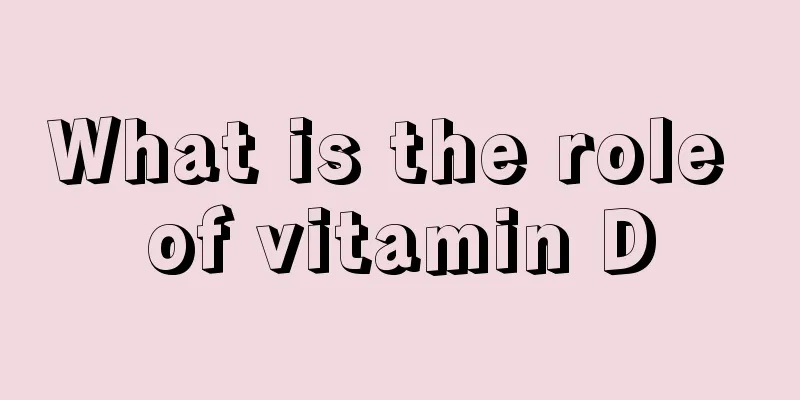What is the role of vitamin D

|
Vitamin D has many medicinal values. It is a vitamin needed by the human body. It is very good for promoting the absorption of calcium and phosphorus. It also helps prevent cancer and reduce the incidence of heart disease. Children's lack of vitamin D will lead to rickets. Therefore, it is recommended that everyone can understand the functions of vitamin D and supplement vitamin D in time. 1. Promote the absorption of calcium and phosphorus The most well-known function of vitamin D is to promote the absorption of calcium and phosphorus, and prevent rickets in children and osteomalacia in adults, because rickets is a disease caused by vitamin D deficiency that causes calcium and phosphorus metabolism disorders. 2. Prevent cancer Vitamin D plays a role in regulating cell proliferation, but this regulatory mechanism is lacking in cancer patients. Therefore, by preventing cells from over-multiplying, vitamin D may protect against certain cancers. 3. Reduce the risk of heart disease Vitamin D can reduce insulin resistance, which is one of the main factors leading to heart disease. 4. Relieve diabetes In type 1 diabetes, the immune system kills the body's own cells. Scientists believe that vitamin D may act as an immunosuppressant, which they think may prevent the immune system from overreacting. 5. Regulate blood pressure Vitamin D is used by the parathyroid glands on the thyroid gland in the neck. These glands secrete a hormone that regulates calcium levels in the body, and calcium helps regulate blood pressure. Symptoms of vitamin d deficiency 1. Bone pain. Adults who are deficient in vitamin D are more likely to experience bone and muscle pain, especially in the winter. Stiffness in joints when getting up in the morning. 2. Depression. Vitamin D can improve levels of the neurotransmitter serotonin, which can improve mood. Studies have found that vitamin D supplementation can significantly reduce the incidence of depression. 3. Aged over 50. The American Cancer Society says that as we age, our skin becomes less able to produce vitamin D. The elderly spend relatively more time indoors and relatively less time in the sun, making them more likely to suffer from vitamin D deficiency. 4. Overweight or obese. Excess body fat can lower blood vitamin D levels. The reason is that vitamin D is fat-soluble. The more body fat you have, the easier it is to be "diluted". People who are overweight or obese may need more vitamin D supplementation. 5. Dark skin. Several studies have shown that skin pigments act as natural sunscreens. Wearing an SPF 30 sunscreen reduces the skin's ability to make vitamin D by 97 percent. Dark-skinned people need to spend 10 times more time in the sun to get the same amount of vitamin D as white-skinned people. 6. The head sweats easily. Sweating on the head is a typical symptom of vitamin D deficiency. 7. Intestinal problems occur. Studies have found that Crohn's disease and celiac or enteritis can affect fat absorption and thus make vitamin D deficiency more likely. What to eat to supplement vitamin D 1. Fatty fish. Fatty fish is an excellent source of vitamin D. These include: salmon, trout, mackerel, tuna, eel, etc. Plus, you get heart-healthy omega-3 fatty acids. 2. Canned tuna. It's not only fresh fish that can provide vitamin D, canned products can also provide it. Canned tuna and canned sardines are rich in vitamin D and are much cheaper than fresh fish. 3. Mushrooms. Just like the human body, mushrooms are able to produce vitamin D. However, mushrooms mostly grow in dark places, so they do not contain vitamin D themselves. However, when they are exposed to ultraviolet rays, they will promote the production of vitamin D. 4. Egg yolk. Egg yolk is the simplest and most convenient way to obtain vitamin D. Since vitamin D is hidden in the egg yolk, the whole egg is the most nutritious. But if you just want to supplement vitamin D by eating eggs, you are wrong. One egg contains about 200 mg of cholesterol. Studies have found that a person's daily cholesterol intake should not exceed 300 mg, otherwise it will endanger heart health. 5. Fortified cereals. Eating fortified cereals is also a good way to get vitamin D. Choosing multigrain cereal or other low-calorie fortified cereals is a good way to get vitamin D. Fortified milk and fortified orange juice are also good choices. 6. Beef liver. Although it is not the best way to obtain vitamin D, it can still meet the vitamin D intake. In addition, it also contains a variety of nutrients, such as vitamin A, iron and protein. However, beef liver is high in cholesterol, so you need to be careful when eating it. |
>>: What vitamins promote calcium absorption
Recommend
What are the benefits of drinking Gastrodia elata soaked in water
Gastrodia elata is a common Chinese medicine. Its...
What are the precautions for smog weather
In autumn and winter, smog weather is frequent. I...
How to remove the black scale on the bottom of the pot
If the pot at home is burned on the fire for a lo...
How often is it best to wash your hair?
When it comes to hair washing, we will find that ...
Can quitting smoking improve sexual function? Quitting smoking makes you more manly
Male friends all have the habit of smoking, which...
Can childhood skin cancer be cured?
Can skin cancer in children be cured? To know the...
What are the causes and symptoms of spinal shock
Spinal shock is an idiopathic disease that follow...
What are the early symptoms of lung cancer? Early lung cancer will have these symptoms
Lung cancer is a relatively common malignant tumo...
What happens if you don’t have a bowel movement for a long time?
A long period of time without bowel movement is m...
What are the adverse consequences of hyaluronic acid dissolving enzyme
Hyaluronic acid dissolving enzyme is actually an ...
What causes prostate cancer
What causes prostate cancer? Prostate cancer may ...
Thyroid follicles
In life, many people suffer from endocrine disord...
Tall and thin girls are more susceptible to breast cancer
Foreign research results show that girls who grow...
How to apply liquid foundation
The most important cosmetic for girls who love to...
These are the folk remedies to prevent hair loss
Hair is an important part that affects our appear...









